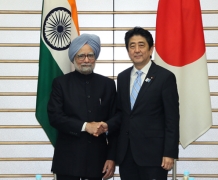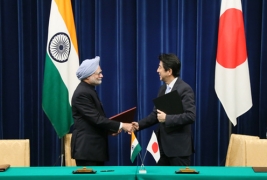Countries & Regions
Visit to Japan by Dr. Manmohan Singh, Prime Minister of India and Mrs. Gursharan Kaur
May 30, 2013
 (Photo: Cabinet Public Relations Office)
(Photo: Cabinet Public Relations Office)
 (Photo: Cabinet Public Relations Office)
(Photo: Cabinet Public Relations Office)
 (Photo: Cabinet Public Relations Office)
(Photo: Cabinet Public Relations Office)
- Itinerary Overview
(1) Dr. Manmohan Singh, Prime Minister of India, and Mrs. Gursharan Kaur paid an official working visit to Japan from May 27 to 30.
(2) Prime Minister Singh and Mrs. Kaur were received in audience by Their Majesties Emperor and Empress in the morning of May 29. In the evening of May 29, the summit meeting between Prime Minister Shinzo Abe and Prime Minister Singh was held followed by signing of a joint statement titled, "Strengthening the Strategic and Global Partnership between Japan and India beyond the 60th Anniversary of Diplomatic Relations" by the two Prime Ministers. In the presence of the two Prime Ministers, Japanese Ambassador to India Takeshi Yagi and Indian Ambassador to Japan Deepa Gopalan Wadhwa signed the Exchange of Notes for yen loan totaling 71 billion yen for the "Mumbai Metro Line-III project". Prime Minister Abe and Prime Minister Singh also received a report on the 5th Japan-India Business Leaders Forum (BLF), which had been held in the morning, from the co-chairpersons, namely Chairman Hiromasa Yonekura of the Japan Business Federation (Keidanren) and Chairman Baba Kalyani of Bharat Forge Ltd. After the summit meeting, Prime Minister Abe and Mrs. Abe hosted a dinner for Prime Minister Singh and Mrs. Kaur, inviting some 80 political and business leaders as well as intellectuals of both countries.
(3) During the stay, Prime Minister Singh received courtesy calls respectively from Minister of Foreign Affairs Fumio Kishida and Minister of Economy, Trade and Industry Toshimitsu Motegi on May 29, Chief Representative Natsuo Yamaguchi of the New Komeito on May 28, and President Banri Kaieda of the Democratic Party of Japan on May 29. - Summit Meeting (Overview)
1. Opening
Prime Minister Abe stated that Japan-India relationship had been deepening and expanding based on the "Strategic and Global Partnership" agreed by Prime Minister Abe and Prime Minister Singh in 2006, and expressed his intention to its further enhancement. Prime Minister Singh welcomed the development of bilateral relations and stated that he would make efforts to further deepen the relationship without being satisfied with status quo.
2. Bilateral Relations
(1) The two Prime Ministers confirmed that Japan and India would make the necessary preparations and coordination for a visit to India by Their Majesties the Emperor and the Empress from the end of November to early December.
(2) In the political and security fields, the two Prime Ministers decided to further improve joint maritime exercises between the Japan Maritime Self-Defense Force and the Indian Navy as well as to establish a Joint Working Group on the US-2 amphibian aircraft.
(3) On civil nuclear cooperation, the two Prime Ministers confirmed that the two countries would accelerate negotiations for the early conclusion of a bilateral agreement for cooperation in the peaceful uses of nuclear energy.
(4) Prime Minister Abe expressed that Japan had decided to provide 17.7 billion yen for the Campus Development Project to Indian Institute of Technology, Hyderabad (Phase 2).
(5) The two Prime Ministers confirmed to cooperate in the areas of large-scale infrastructure and energy projects including the Delhi-Mumbai Industrial Corridor (DMIC) and high speed railway system in India. In particular, the two Prime Ministers decided to conduct a joint feasibility study of High Speed Railway system with the Mumbai-Ahmedabad route in mind.
(6) Prime Minister Abe expressed his intention to encourage the expansion of Japanese investment in India including through business matching activities. Prime Minister Abe also expressed hope for further easing of regulations by India in the financial, tax and investment fields.
(7) The two Prime Ministers decided to cooperate in such new fields as space.
3. Regional and Global Issues
Prime Minister Abe and Prime Minister Singh exchanged views on the regional situation in Asia and confirmed continued bilateral cooperation on global issues such as reform of the United Nations Security Council, disarmament and nuclear non-proliferation. -
Courtesy Call by Foreign Minister Kishida (Overview)
1. Mr. Fumio Kishida, Minister of Foreign Affairs, expressed satisfaction with the steady development of the "Strategic and Global Partnership" between Japan and India, noting that the Abe administration attaches importance on the strengthening of the bilateral relationship. Noting that there have been preparations and coordination to realize a visit to India by Their Majesties the Emperor and the Empress, Minister Kishida stated that this year would become a historical year for both Japan and India. Minister Kishida also stated that as Minister in charge of Japan's diplomacy, he personally would make every effort to the deepening and expansion of the bilateral relations.
2. Prime Minister Singh responded that he looked forward to further deepening and expanding "India-Japan Strategic and Global Partnership", adding that Indians have a deep respect for Japan and the Japanese people, and they hope for a close partnership with Japan. Prime Minister Singh also expressed hope that investment in India by Japanese business entities, particularly infrastructure and manufacturing companies, would further expand under the Japan-India Comprehensive Economic Partnership Agreement that took effect in 2011. Prime Minister Singh further expressed hope for expanded cooperation between the two countries not only in the economic area but also political and security areas. Prime Minister Singh heartily welcomed the visit to India by Their Majesties, noting that he would make all-out efforts for a successful visit. Prime Minister Singh stated that he had dedicated himself to the development of Japan-India relations for the past nine years as prime minister of India and would continue to do so. -
Assessment
(1) Prime Minister Abe and Prime Minister Singh reaffirmed the development of the "Japan-India Strategic and Global Partnership" which was established by them in 2006. The two Prime Ministers decided to make preparations and coordination to realize a visit to India by Their Majesties the Emperor and the Empress from the end of November to early December.
(2) Prime Minister Singh's visit to Japan, his fifth as prime minister, served as an opportunity for the two countries to confirm their commitment to strengthening political and security cooperation further and produced many concrete outcomes in the economic field, including the DMIC, a high-speed railway system in India, and yen loans for Mumbai Metro. The two Prime Ministers also decided to accelerate negotiations for the early conclusion of a bilateral agreement for cooperation in the peaceful uses of nuclear energy. The two Prime Ministers had fruitful exchanges of views on a wide range of fields, including regional and global issues, befitting their position as strategic and global partners.
(3) India is strategically an important country for Japan, sharing such basic values as freedom, democracy, fundamental human rights and the rule of law, and positioned on sea lanes between the Middle East and East Asia. The latest visit to Japan by Prime Minister Singh is a step toward a new phase in the relationship between Japan and India, which marked the 60th anniversary of the establishment of the diplomatic relations in 2012.

